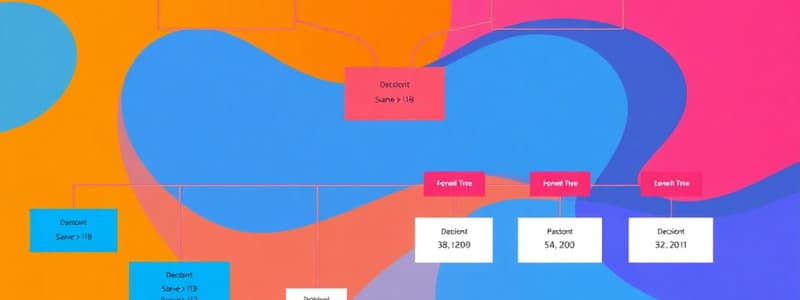Podcast
Questions and Answers
What is the primary purpose of a flow chart in system analysis?
What is the primary purpose of a flow chart in system analysis?
To visually represent the sequence of steps in a process or system.
How do decision tables assist in decision-making processes?
How do decision tables assist in decision-making processes?
They provide a structured way to analyze multiple conditions and their respective actions.
Explain how structured English differs from traditional programming languages.
Explain how structured English differs from traditional programming languages.
Structured English uses plain language with a limited vocabulary and syntax to describe processes, making it more understandable.
What advantage does HIPO provide during system design?
What advantage does HIPO provide during system design?
How can decision trees be utilized in evaluating potential solutions?
How can decision trees be utilized in evaluating potential solutions?
Flashcards
Flowchart
Flowchart
A visual representation of a process or algorithm, using boxes and arrows to show the flow of data and control.
Decision Tables
Decision Tables
Tables that display a series of conditions and corresponding actions, used to organize complex decision logic.
Decision Trees
Decision Trees
A graphical representation of a hierarchical structure, where each branch represents a specific function or module within a system.
Structured English
Structured English
Signup and view all the flashcards
HIPO (Hierarchy plus Input-Process-Output)
HIPO (Hierarchy plus Input-Process-Output)
Signup and view all the flashcards
Study Notes
Flowchart
- A flowchart is a graphical representation of a process or algorithm.
- It uses standardized symbols to depict different steps, decisions, and connections.
- Symbols include:
- Oval (start/end)
- Parallelogram (input/output)
- Rectangle (process)
- Diamond (decision)
- Arrow (flow direction)
- Flowcharts provide a visual approach to understanding program logic.
- Useful for documenting and communicating processes.
Decision Tables
- A decision table is a structured method for representing complex decision logic.
- It presents conditions and their corresponding actions in a tabular format.
- Columns represent conditions (e.g., input values, states) and actions (outcomes).
- Rows correspond to different decision rules.
- Decision tables reduce ambiguity and improve clarity in decision-making processes.
- Useful when many conditions and actions are involved in a decision.
Decision Trees
- A decision tree is a tree-like model used for decision-making under uncertainty.
- Each branch represents a possible decision or event.
- Nodes represent events or decisions and branches represent outcomes.
- Used to visualize various options and their potential consequences.
- Enables analysis of the probability of different outcomes based on particular choices.
- Useful to calculate the expected value associated with each choice.
Structured English
- Structured English is a way to represent algorithms using English-like statements.
- Employing a controlled vocabulary and logical structures.
- Easier to understand for programmers and non-programmers.
- Avoids ambiguities present in natural language.
- Maintains logical sequence in an organized manner.
- Allows for effective algorithm representation and explanation.
HIPO (Hierarchy plus Input-Process-Output)
- HIPO is a technique used for systems design and documentation.
- A top-down hierarchical approach to describing the system.
- Used to demonstrate the system's different levels of organization.
- It includes a hierarchical chart to provide an overview.
- Input-process-output (IPO) charts provide detailed descriptions for each module.
- Helps in clear communication and understanding of system components and functionalities.
- Useful for managing complex systems.
Studying That Suits You
Use AI to generate personalized quizzes and flashcards to suit your learning preferences.



